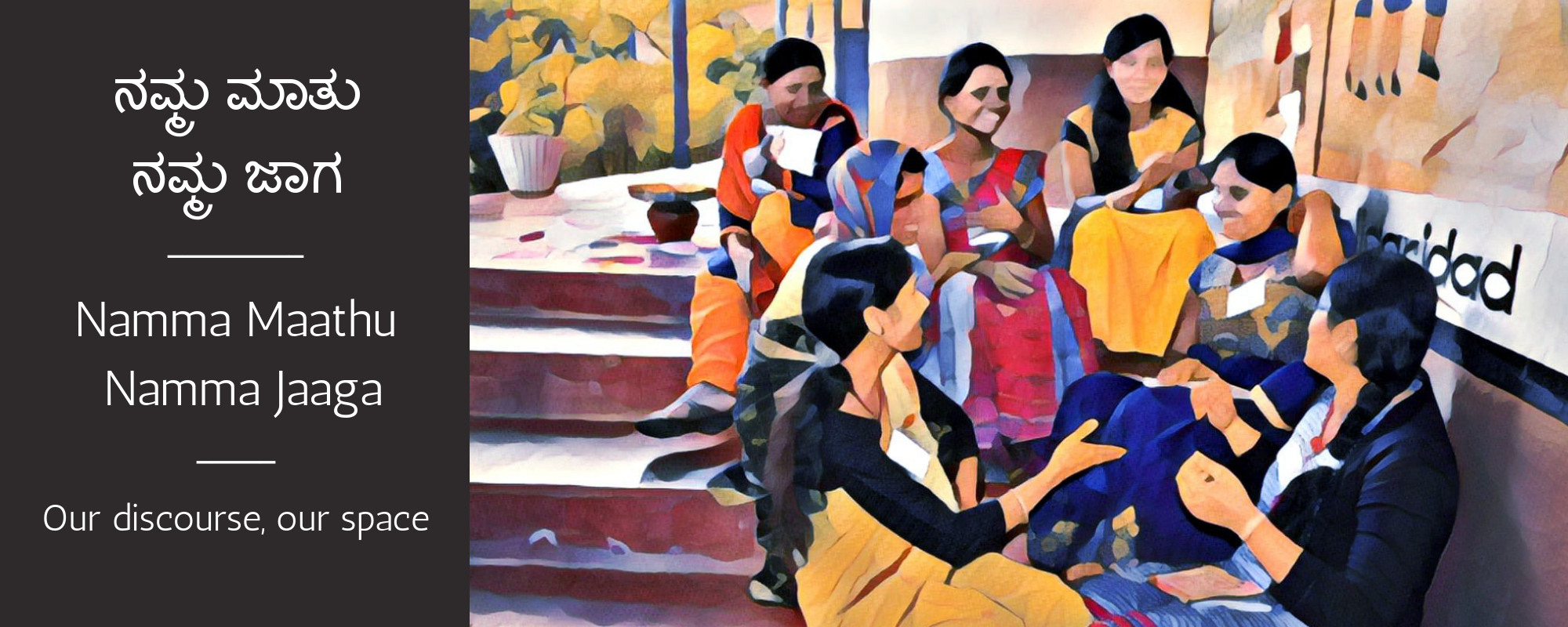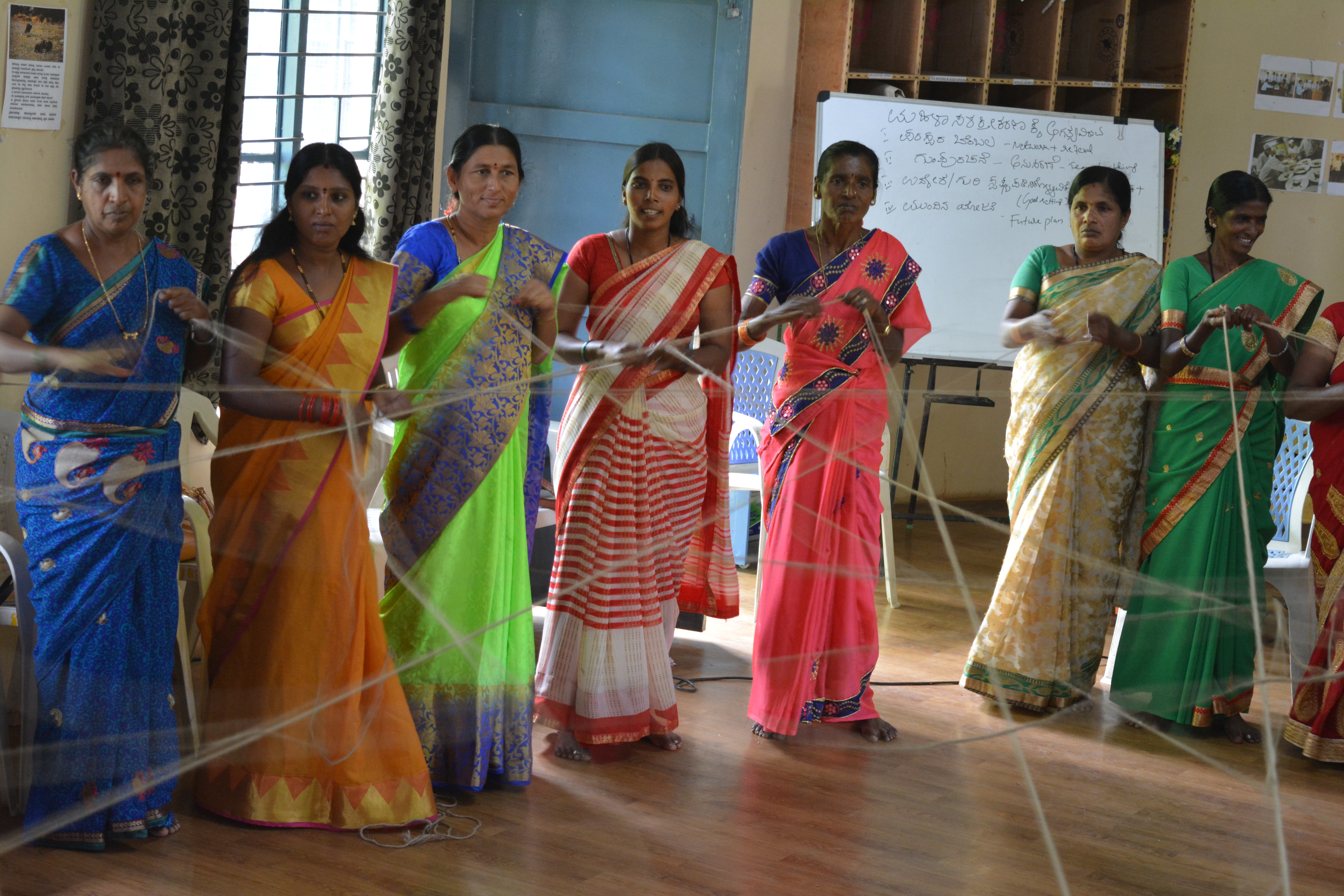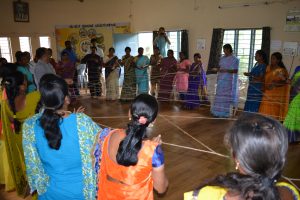
Paracounselors training: Part III
Sarada Mahesh | June 2019
Through the course of the training, the women were taken through various activities, the final objective of which was to teach women to strike a balance between their lives and the work of counselling and supporting other women

The guest house of Myrada at HD Kote was filled with the laughter and conversations of the 28 participants of the final phase of the anganwadi workers training. The women settled themselves in their dormitories, excited for the three day training session that was to follow. Over breakfast, they interacted with the us as well as the trainers from Samvada, eager to know the activities planned out for them and to share their experiences.
The training began with the viewing of the two documentaries made by the Prakriye team, showcasing the activities done in the previous two trainings. A discussion ensued with the participants on what they had learnt from the previous sessions and how it had impacted them, both personally and professionally. “Initially, we used to believe that women’s issues were something that should only be dealt with at the household level, and sometimes at the sangha level. But after these trainings, we have come to realise that these are issues that affect one woman also affect all of us as well.” They shared that the counselling sessions have allowed them to create a stronger bond with the women, further helping develop relationships of trust between them.
“Initially, we used to believe that women’s issues were something that should only be dealt with at the household level, and sometimes at the sangha level. But after these trainings, we have come to realise that these are issues that affect one woman also affect all of us as well.”
Through the course of the next three days, the trainers took the women through various activities the final objective of which was to teach women to balance between their lives and the work of counselling and supporting other women. One of these ways was to connect to institutions set up explicitly to support other women. This networking process was important as it would also help streamline the support to be given to the women while also taking some burden from the shoulders of the para-counsellors. It was important to remember that this was not a fight that any woman could take up alone, explained Kirana, the trainer from Samvada.
But domestic violence wasn’t the only issue affecting women. “The financial burden on women to repay the debts is immense. There are cases of women drowning themselves and committing suicide just to get away from this burden.” The trainers understood that this was an important issue, and said that the first step to helping women with this problem was by talking to them. Being a small community, they would know of the financial problems faced by families in the community. Apart from giving space to the women to talk about their problems, they could also work with the Prakriye team to screen documentaries and initiate discussions on topics such as money management and sharing the burden of repaying loans.
The trainers also included interactive activities in the training to break away from the seriousness of the discussion once in a while. One such activity was where the women were asked to balance a plate on their head while holding cups in their hands. They were asked to walk a certain distance while ensuring that they maintain the balance the whole way. While some women were able to successfully do it, others could not do so. But they were encouraged to pick up the plate and cups and walk again. “Just like the game, you’re also required to maintain a balance between your personal and professional life. Obstacles are bound to come your way and you just might tumble and fall. But it’s also important to remember that you can get up and lead a normal life again.” The trainers told the para-counsellors to take the same lesson to the women victims of domestic violence – to encourage them to pick themselves up and fight against all odds and build a life for themselves despite all odds. The women agreed that this was important and that while it may be difficult to do in the initial stages, consistency is key in order to extend support to the woman.
The short film 69 was also screened. Through the film, an alternate reality was shown such as women being abusive to their husbands who silently took the pain, and harassment of men on public transport by women. “The film was funny but also showed real world problems,” shared a participant. “Unfortunately, the we cannot experience this alternate reality. Nor do we want to. Violence and harassment should not be a problem of either gender. Rather, society should watch this film with a view to put an end to these problems.”
The para-counsellors expressed that the trainings by the Prakriye team and the sakhis during the sangha meetings were not just informative, but were also a very helpful starting point to initiate discussions with women, girls and their families on many sensitive issues such as child marriage, violence against women and gender stereotypes
During the discussions, the para-counsellors expressed that the film screenings done by the Prakriye team and the sakhis during the sangha meetings were not just informative, but were also a very helpful starting point to initiate discussions with women, girls and their families on many sensitive issues such as child marriage, violence against women and gender stereotypes. The team then asked the women if they would be interested in learning how to operate tablets, from where they could themselves watch and share these videos directly with the women from their village even outside of the regular screenings done by the Prakriye team. The participants excitedly agreed for this. The team took some time on the second day of the training to introduce the women to the tablets. Each woman was given one tablet and was taught how to turn it on and off. They then were then taken through different applications of the tablet such as taking photographs, audio and video recordings and were also given precautions that they had to follow while using the device. The participants eagerly listened and were encouraged to experiment with the camera. They began to rush outside into the garden and took pictures of themselves, their fellow participants and the venue. The sakhis and the team moved around to help the women whenever they had any problem while using the tablet.
“If we were to organise a one day training specifically dedicated to teaching you how to navigate through the tablet, would you be interested?” asked the Prakriye team. They were received with a unanimous agreement by the women who asked them to do it at the earliest.
 By the end of the training, the participants shared that they felt a mixture of sadness, joy and clarity. “Usually such trainings only give and take information from us. This was the first training where our voices were given importance. We were allowed the freedom to express ourselves while also getting opinions and possible solutions to the problems faced by us,” shared a participant. “More importantly,” continued another,” we know that we’re not alone. Working as a team, we can make small changes to the patriarchal mindset of society, and help women victims to fight back and make a life for themselves despite all odds.” They thanked the trainers and the Prakriye team for the training, and also looked forward to connecting with them in the future as a part of their para-counselling processes with the women.
By the end of the training, the participants shared that they felt a mixture of sadness, joy and clarity. “Usually such trainings only give and take information from us. This was the first training where our voices were given importance. We were allowed the freedom to express ourselves while also getting opinions and possible solutions to the problems faced by us,” shared a participant. “More importantly,” continued another,” we know that we’re not alone. Working as a team, we can make small changes to the patriarchal mindset of society, and help women victims to fight back and make a life for themselves despite all odds.” They thanked the trainers and the Prakriye team for the training, and also looked forward to connecting with them in the future as a part of their para-counselling processes with the women.